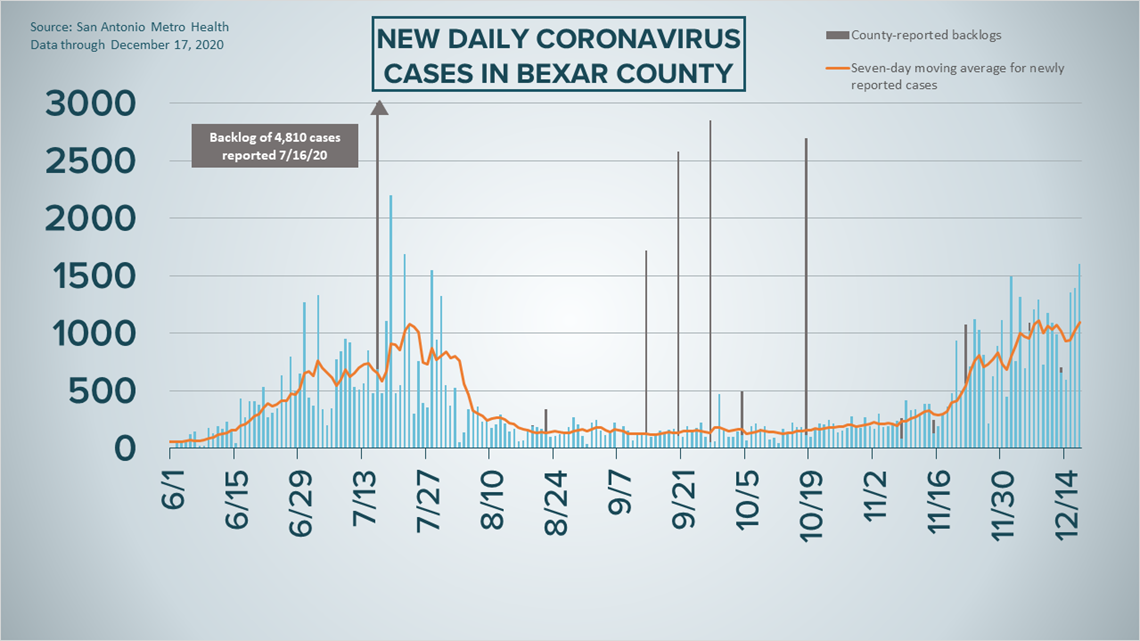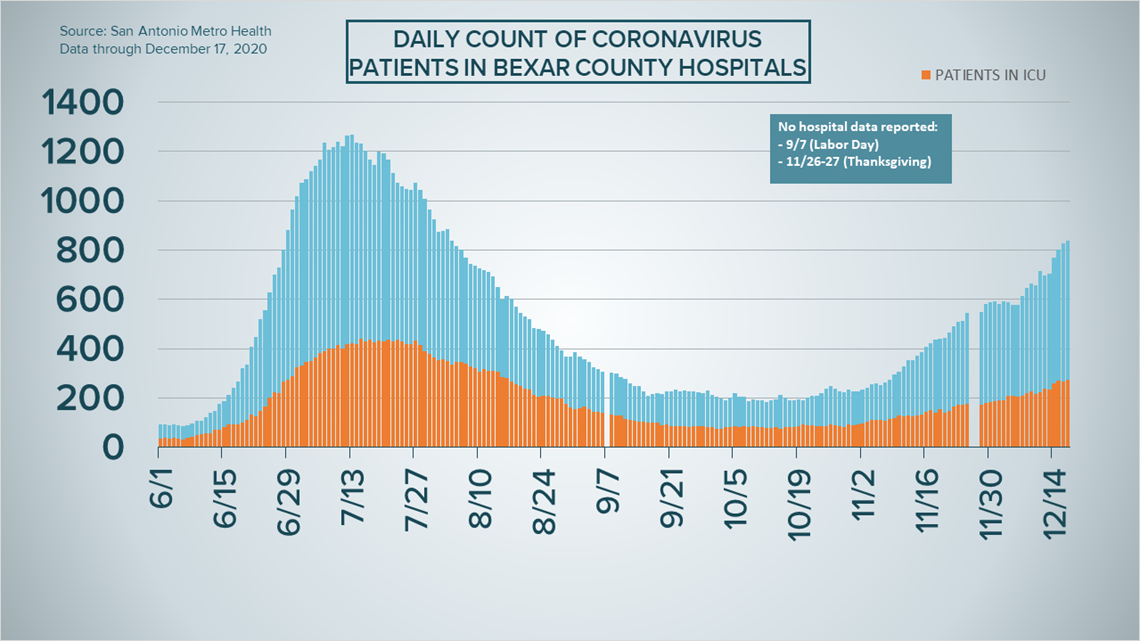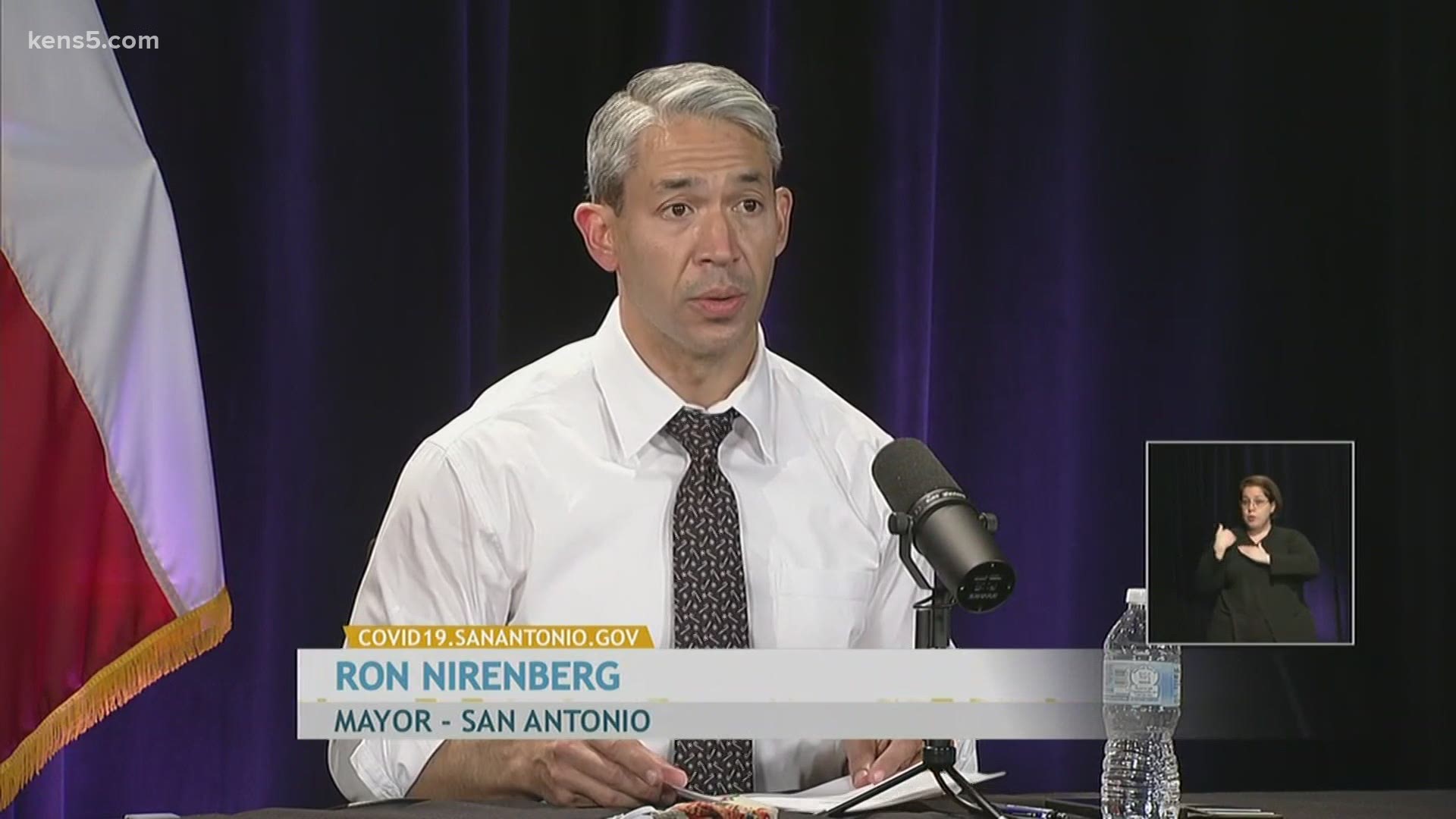SAN ANTONIO — We're tracking the latest numbers from the coronavirus pandemic in San Antonio and across Texas. Here are the latest numbers reported by Bexar and surrounding counties:
- Bexar County: 1,606 new cases were reported on Thursday, bringing the total number of cases to 99,142. No new deaths were reported; the death toll stands at 1,440 fatalities due to COVID-19 in the county.
- Hays County: Officials in Hays County on Thursday reported 151 new cases in the county and three additional COVID-related fatalities. Officials say the county's epidemiology team was "unable to run a full report today" due to a technical issue. As of Thursday, there are a total of 8,569 lab-confirmed local cases (1,203 of which are active), while the death toll jumped to 113. 7,253 residents have recovered from the virus.
- Comal County: Comal County reported an additional 72 coronavirus cases – 49 confirmed, 23 probable – on Thursday, bringing its total to 5,576. Officials also tallied two new coronavirus-related fatalities, raising the death toll for the county to 141. The county estimates 781 active cases on Thursday, while 4,654 residents have recovered.
More county case information is available through the Texas Department of Health Services COVID-19 dashboard.
How Bexar County is trending
We've tracked how many coronavirus cases have been confirmed in Bexar County from the time officials began reporting cases in March 2020. The graphic below shows the number of cases since June and charts those daily case numbers along a 7-day moving average to provide a more accurate picture of the overall coronavirus case curve in our area and the direction we're trending amid the pandemic.
On Thursday evening, San Antonio Mayor Ron Nirenberg reported 1,606 new COVID-19 diagnoses, the largest number of newly-reported cases since July 22. Thursday marked the third day in a row of more than 1,300 new cases, propelling the county's seven-day rolling average to 1,100.
The county is on pace to hit 100,000 cases by the weekend; currently, 99,142 residents have been diagnosed with the virus as the vaccine begins to slowly roll out across the county.


Nirenberg also reported no additional COVID-19-related deaths; a total of 1,440 Bexar County residents have died due to coronavirus complications as of Thursday evening.
Coronavirus-related hospitalizations rose for a fifth straight day on Thursday, with 837 total patients receiving treatment for their symptoms. Nirenberg said that number is the result of 104 new hospital admissions overnight.
Of those 837 patients, 134 are on ventilators and 272 are in intensive care.


Both Nirenberg and Bexar County Judge Nelson Wolff emphasized that safety precautions and social distancing should remain a priority to curb the virus's holiday-season surge.
"It's not accelerating at the pace that it was in the summer, which is a good thing. But we need to work to reduce those numbers because hospitals are under severe stress," Nirenberg said.
Coronavirus in Texas
Here's how Texas stood as of Thursday evening:
The total number of novel coronavirus cases in the state since the pandemic began grew by 20,338 on Thursday according to the Texas Department of State Health Services. That total includes 16,864 new confirmed cases, 3,524 new probable cases, and 812 cases attributed to backlogs not previously reported in the state's total (more details can be found at the top of this page).
As of Thursday, nearly 1.54 million Texans have been diagnosed with COVID-19. The state's seven-day moving average for daily cases has reached 14,773, which is the highest seven-day average recorded in the ongoing pandemic.


State health authorities also reported 266 additional virus-related deaths on Thursday. At least 24,660 Texans have died from COVID-19 complications.
The number of COVID-19-related hospital patients in the state rose by 100 overall patients in the last 24 hours; in all, 9,628 Texans are receiving treatment at hospitals for coronavirus symptoms on Thursday. July 27 was the last time the figure was that high.
Meanwhile, the state estimates that 1.231 million Texans have recovered, while 269,789 Texans remain ill with COVID-19.
The latest update from the Texas Education Agency showed that there have been 77,808 cumulative cases among staff and students across the state through Dec. 6. That number comprises 48,875 positive student cases and 28,933 staff cases. More information can be found here.
The TEA releases new data on school cases on Fridays.
Latest Coronavirus Headlines
- Second COVID-19 vaccine by Moderna receives backing from key FDA panel
- How much is the new stimulus check? Answering your questions
- VERIFY: False lists of coronavirus vaccine side effects vs. the facts
- ‘Give the reindeer masks and the elves,’ Kid writes Santa letter not asking for toys but instead gives COVID-19 safety advice
- Texas anticipates receiving 620,000 vaccine doses in second week of distribution
- COVID-19 VACCINE TRACKER: What you need to know about effectiveness and distribution phases in San Antonio and South Texas
- French President Macron tests positive for COVID-19
- US jobless claims rise to 885,000 amid resurgence of coronavirus
Coronavirus symptoms
The symptoms of coronavirus can be similar to the flu or a bad cold. Symptoms include fever or chills, cough, shortness of breath or difficulty breathing, fatigue, muscle or body aches, headache, new loss of taste or smell sore throat, congestion or runny nose, nausea or vomiting and diarrhea, according to the Centers for Disease Control.
Most healthy people will have mild symptoms. A study of more than 72,000 patients by the Centers for Disease Control in China showed 80 percent of the cases there were mild.
But infections can cause pneumonia, severe acute respiratory syndrome, kidney failure, and even death, according to the World Health Organization. Older people with underlying health conditions are most at risk.
But infections can cause pneumonia, severe acute respiratory syndrome, kidney failure, and even death, according to the World Health Organization. Older people with underlying health conditions are most at risk.
Experts determined there was consistent evidence these conditions increase a person's risk, regardless of age:
- Chronic kidney disease
- COPD (chronic obstructive pulmonary disease)
- Obesity (BMI of 30 or higher)
- Immunocompromised state (weakened immune system) from solid organ transplant
- Serious heart conditions, such as heart failure, coronary artery disease, or cardiomyopathies
- Sickle cell disease
- Type 2 diabetes
The CDC believes symptoms may appear anywhere from two to 14 days after being exposed.
Human coronaviruses are usually spread...
- Between people who are in close contact with one another (within about 6 feet).
- Through respiratory droplets produced when an infected person coughs, sneezes or talks. These droplets can land in the mouths or noses of people who are nearby or possibly be inhaled into the lungs.
- Some recent studies have suggested that COVID-19 may be spread by people who are not showing symptoms.
Help stop the spread of coronavirus
- Stay home when you are sick.
- Eat and sleep separately from your family members
- Use different utensils and dishes
- Cover your cough or sneeze with your arm, not your hand.
- If you use a tissue, throw it in the trash.
Find a Testing Location
City officials recommend getting a COVID-19 test if you experience fever or chills, cough, shortness of breath or difficulty breathing, fatigue, muscle or body aches, headache, new loss of taste or smell, sore throat, congestion or runny nose, nausea or vomiting, or diarrhea.
San Antonio operates several no-cost testing locations, including two walk-up locations open Monday-Sunday from 10 a.m. until 2 p.m.:
Cuellar Community Center
5626 San Fernando St.
San Antonio, TX 78237
Ramirez Community Center
1011 Gillette Blvd.
San Antonio, TX 78224
Additionally, Freeman Coliseum offers drive-through no-cost testing from Monday through Sunday between 9 a.m. and 4 p.m. An appointment is required and can be made either online or by calling (833) 213-0643.
Here's a Testing Sites Locator to help you find the testing location closest to you in San Antonio.

